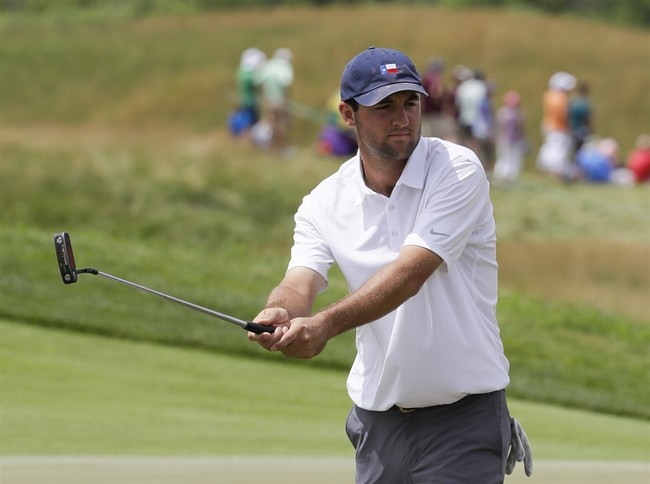There was a moment this week—brief, unassuming, and barely covered in the blaring swirl of press microphones and boom cameras—when one of the most dominant athletes in the world offered a sermon disguised as a shrug.
Scottie Scheffler, the current World No. 1 in golf, sat before a packed room of reporters ahead of the 153rd Open Championship in Northern Ireland. As expected, the questions were incessant: what does it mean to be No. 1, what drives him to win, how does he stay so mentally sharp? Sports journalists, trained to extract sound bites, wanted a narrative. Scheffler gave them something far more meaningful.
“There’s a theme,” he said early on. “The thrill of victory, it lasts a few minutes.”
Let that sit with you for a moment. From a man who had five PGA Tour wins in 2024 alone. A guy who, at 28, is already being compared to the legends. A player whose effortless precision and humility have become the stuff of lore. And yet, for all his wins, all the trophies, all the green jackets and glittering titles—Scheffler gently insisted: That’s not where I draw fulfillment.
When pressed further on what he was reading that week, reporters likely expected a biography, a mental toughness manual, or perhaps a deep dive into sports psychology. Instead, Scheffler held up two volumes: a devotional and his Bible.
In a world where most top-tier athletes spend downtime curating Instagram-perfect meals or posting brand endorsements, Scheffler spends his time reading about faith, forgiveness, and truth. He doesn’t escape from the pressure with self-help books. He returns to Scripture. In a moment where the world expects affirmation of one’s greatness, Scheffler answers with a reminder of God’s.
But the moment that stilled the room—and that should stir every heart with ears to hear—was when he was asked how fulfilling it would be to win the 153rd Open. This is golf’s oldest championship. For many, it is the pinnacle of the sport. And yet Scheffler didn’t take the bait.
“Winning golf tournaments doesn’t fulfill me,” he said plainly. “Being a faithful husband does. Being an engaged father does.”
That right there is the story.
In a sports world addicted to me-first mantras and ego-driven legacies, Scheffler’s priorities are a gut-check to every man who has ever tried to find identity in achievement rather than relationships. He made no apologies for ranking his role as a husband and dad above his career. And what’s more remarkable—he meant it.
This isn’t posturing. This is a pattern.
Go back to May 2024, the shocking scene outside Valhalla Golf Club in Louisville, where Scheffler was arrested in a misunderstanding that turned national. The footage showed chaos. The world gasped. Yet just hours later—after all charges were dropped—Scheffler expressed no anger, no bitterness. Instead, he emphasized his support for law enforcement and said he had “forgiven everyone involved.”
This isn’t a polished PR strategy. It’s who he is.
And who he is should challenge all of us.
In a time when marriage rates are in decline, when fatherlessness is one of the most destructive forces facing children, and when culture tells men that fulfillment is something you win, Scheffler says otherwise. He insists it’s not about what you accomplish but who you become in the eyes of your wife, your children, and your God.
What if more men chased that legacy?
What if instead of being defined by job titles, wins, or wealth, we measured success by the strength of our marriages and the time we invest in our children? What if the high-achieving alpha wasn’t the guy who made the most money but the man who knelt beside his child’s bed at night to pray?
Scheffler’s faith informs everything—his wins, his calm under pressure, his humility, and most of all, his compass. He’s not chasing golf history. He’s not driven by legacy. He’s aiming at faithfulness in things that outlast it all.
And yet, history came calling anyway.
Late Sunday in Ireland, Scottie Scheffler dropped his final putt for par on the 18th at Royal Portrush to win the 153rd Open Championship. In doing so, he became only the ninth golfer in history to achieve three-fourths of the career Grand Slam. It was also his fifth major title—won on the exact same number of days into his professional career as Tiger Woods had taken to win his fifth. The headlines wrote themselves.
But to Scottie, none of that truly mattered.
What did matter was waiting just off the green: a beaming wife, and a bouncing not-so-little baby boy. That was the moment that fulfilled him. That was the reward that mattered.
There’s a deep irony here: the man at the top of the golfing world is the one least enamored with the view.
And isn’t that what real leadership looks like? Living in a way that doesn’t just dominate a sport but elevates the soul? Scheffler reminds us that being great isn’t about being celebrated—it’s about being centered.
He’s not chasing applause. He’s chasing obedience.
And that, friends, is what will make all the difference.
Because you and I may never swing a club like Scottie Scheffler. We’ll never putt under pressure on Sunday at Augusta or drive the green at St. Andrews. But we can model his values. We can be husbands who pursue our wives with intentionality. Fathers who turn off the noise and listen to our children. Men who put faith first and ambition second.
Scheffler’s words—gently offered, humbly delivered—might not win headlines, but they could save marriages. They might not trend on Twitter, but they could rebuild families. They won’t make ESPN’s Top 10, but they’re the stuff of eternity.
And if the World No. 1 in golf tells us that being No. 1 doesn’t satisfy, maybe it’s time we stop chasing trophies—and start chasing truth.





